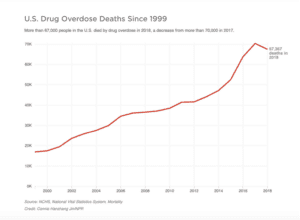
Recent figures released by the Centers for Disease Control indicate that 2018 saw the first decline in drug overdose deaths since 1999. Overdose fatalities dropped by 4.1%, compared to 2017, and the drop mostly involved natural and semi-synthetic opioids. Despite the improvement, the numbers remain staggeringly high. In 2018, overdoses killed 67,000 Americans, compared to 70,000 the year prior. Alarmingly, that makes 2018 the country’s second-deadliest year on record, with drug deaths killing more people than gun violence or car crashes. As we’ve written in the past, at it’s worst, the HIV crisis led to 43,000 deaths in 1995, while in 1972, car crashes killed a record-setting 55,000 people in the country.
Notably, overdose rates did not decrease uniformly across the country. Fourteen states—including some who had been hard hit by the opioid crisis, like Ohio and West Virginia saw improvements, while many others, like California, Delaware, Missouri, New Jersey, and South Carolina, saw increases on trend with past years.
Drug deaths involving potent synthetic opioids like fentanyl continued to rise in 2018, as did those involving cocaine and methamphetamine.
“It’s worth noting that in many instances those stimulants are combined with opioids,” noted the CDC’s Bob Anderson, who oversaw the new reports. “So it’s fairly common to see fentanyl and methamphetamine, for example, or fentanyl and cocaine mixed together.”
The use of a combination of drugs has increased over time, he says. “We seem to have sort of traded one set of drugs for another.” Experts have called this dark trend the “fourth wave of the opioid crisis,” following a first wave fueled by prescription pills, a second wave from heroin and third, starting in 2014 from synthetics like fentanyl. The drug combinations makes addiction a harder problem to tackle, says Dr. Daniel Ciccarone, a professor of medicine and an addiction researcher at the University of California, San Francisco. “The crisis deepens because of the poly-drug phenomenon.”
Addressing the crisis requires a serious look at prevention efforts.
Treating the Roots of Addiction
Despite this bleak picture, the data indicate some scattered reasons to be hopeful. I think these numbers suggest that some positive news is starting to come out of the many efforts to try to stem the tide on overdoses,” says Kathryn McHugh, a psychologist at McLean Psychiatric Hospital and Harvard University told NPR.
However, all indications suggest that the swell of addiction rates in the country is not merely a reflection of an out-of-control pharmaceutical industry, or overprescribing by doctors. The issue—along with its roots and solutions, are complex.
Dr. Ciccarone commented on this in an interview with NPR: “We have to move away from this understanding that we’re just going to treat it as a supply-side phenomena,” Ciccarone says. “As ‘let’s stop the opioid pills, let’s stop the excess prescribing.’
“Instead, we also have to address what’s driving the demand for these drugs in communities, he says. “There’s a large amount of social, economic, spiritual despair in this country,” says Ciccarone. “And because we’ve underappreciated that phenomena, we’ve under-appreciated that there’s a demand side to problematic drug consumption.”
Addressing that despair, he says, will be key to preventing more people from turning to drugs in the first place.
Solutions-Focused Treatment After Overdose
At Scottsdale Providence, our clinicians are experienced and knowledgeable about addiction and what it takes to recover. We realize that successful treatment requires addressing root causes and finding long-term and meaningful solutions.
We believe in treating people in their entirety, and our seasoned team applies a variety of modalities and treatment methods in order to give each individual a real shot at success. We emphasize connection, growth and healing in order to help people get free of their addiction and move towards the life they’ve always wanted.
If you or someone you care about needs help with a substance abuse problem, reach out today. We’d love to hear from you.
